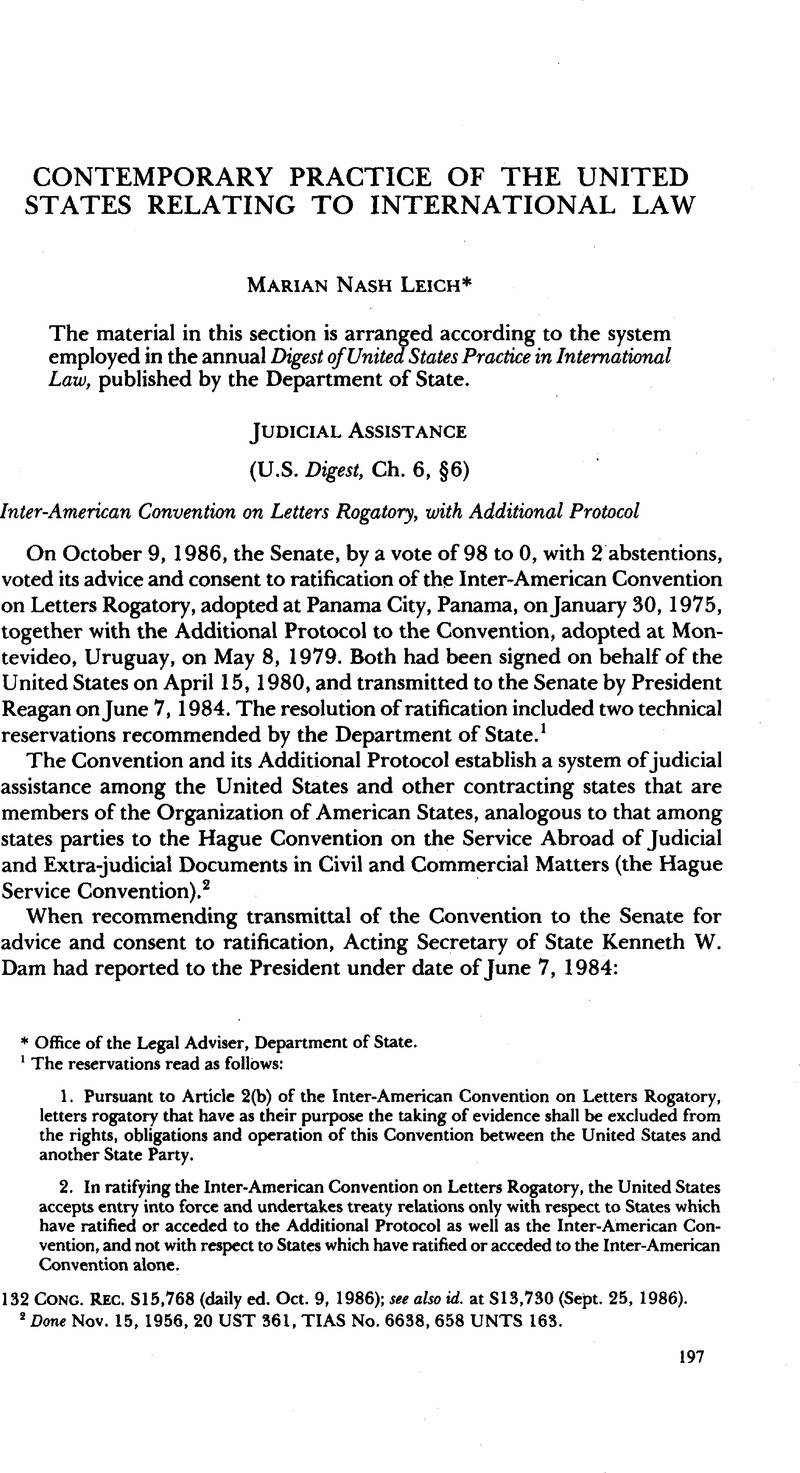No CrossRef data available.
Article contents
Contemporary Practice of the United States Relating to International Law
Published online by Cambridge University Press: 27 February 2017
Abstract

- Type
- Contemporary Practice of the United States Relating to International Law
- Information
- Copyright
- Copyright © American Society of International Law 1987
References
page no. 197 note 1 The reservations read as follows:
-
1. Pursuant to Article 2(b) of the Inter-American Convention on Letters Rogatory, letters rogatory that have as their purpose the taking of evidence shall be excluded from the rights, obligations and operation of this Convention between the United States and another State Party.
-
2. In ratifying the Inter-American Convention on Letters Rogatory, the United States accepts entry into force and undertakes treaty relations only with respect to States which have ratified or acceded to the Additional Protocol as well as the Inter-American Convention, and not with respect to States which have ratified or acceded to the Inter-American Convention alone.
Cong. Rec. S15, 768 (daily ed. Oct. 9, 1986); see also id. at S13, 730 (Sept. 25, 1986).
page no. 197 note 2 Done Nov. 15, 1956, 20 UST 361, TIAS No. 6638, 658 UNTS 163.
page no. 199 note 3 S. Treaty Doc. No. 27, 98th Cong., 2d Sess., at iii–v, xii (1984).
page no. 200 note 1 Subsequently, on Sept. 26, 1986, Ambassadors Padraic MacKernan (for Ireland) and Sir Antony Acland (for the United Kingdom of Great Britain and Northern Ireland) and M. Peter McPherson, Administrator of the Agency for International Development, signed a tripartite agreement setting out the parties' understanding regarding the fund and its financing by the United States. Article 2 provided that, before establishment of the fund, the Governments of Ireland and of the United Kingdom (the "two Governments"), and after its establishment, the board of the fund would involve the United States (the "Donor") in substantive discussions in order to take into account, inter alia, the concerns and the procedural and programmatic emphases expressed by Congress in authorizing and appropriating the assistance granted. In Article 3 the United States agreed to grant as a contribution to the fund's capital a sum not to exceed $50 million, with disbursement taking place only after the two Governments had furnished to the Donor evidence, as detailed in Article 4, of the establishment of a trust account with a recognized trustee bank, which would receive and hold the grant pending (completion of) legal establishment of the fund and satisfaction of certain evidentiary requirements regarding its administration and operation, specified in Annex B to the Agreement. Dept. of State Files L/T.
page no. 201 note 1 Pub. L. No. 99-440, 100 Stat. 1086 (1986) (to be codified, as amended by Pub. L. No. 99-631, at 22 U.S.C. §5001 etseq.).
page no. 202 note 2 50 Fed. Reg. 40,325 (1985). See 80 AJIL 153, 157 (1986). Section 510 of the 1986 Act contains a similar import prohibition as to any gold coin minted in the USSR or offered for sale by the Soviet Government.
page no. 202 note 3 See also sec. 1(d), Exec. Order No. 12532, 50 Fed. Reg. 36,861 (1985), discussed in 80 AJIL at 155.
4 See 80 AJIL at 154.
5 See sec. 128 of the Atomic Energy Act of 1954, as added by sec. 306 of the Nuclear Non-Proliferation Act of 1978, 42 U.S.C. §2157. See also sec. 1(c) of Exec. Order No. 12532, supra note 3, discussed in 80 AJIL at 154-55.
6 Done July 1, 1968, 21 UST 483, TIAS No. 6839, 729 UNTS 161.
7 Nor does the prohibition apply to loans or credit extensions under agreements entered into before the date of enactment of the Act. A comparable prohibition has been in effect under sec. 1(a) of Exec. Order No. 12532, supra note 3, discussed in 80 AJIL at 154.
8 May 23, 1947, 61 Stat. 3057, TIAS No. 1639, as amended July 21 and Nov. 2, 1953, 4 UST 2205, TIAS No. 2870, and June 28, 1968, 19 UST 5193, TIAS No. 6512.
9 On Oct. 8, 1986, Deputy Secretary of State John C. Whitehead dispatched a note to South African Ambassador Johannes Hermanus Albertus Beukes in which he requested "consultation pursuant to paragraph (B) of Article XI of the Agreement" and gave notice "pursuant to paragraph (D) of Article XI to terminate the Agreement. The Agreement shall terminate one year after the date of receipt of this notice, which is being simultaneously communicated to the International Civil Aviation Organization." Dept. of State File No. P86 0130-0731.
10 Dec. 13, 1946, 3 UST 3821, TIAS No. 2510, 167 UNTS 171; Protocol dated July 14, 1950, 3 UST 3821, TIAS No. 2510, 167 UNTS 188. On Oct. 15, 1986, the Department of State notified the South African Embassy that, in accordance with Article XVIII of the Convention, the United States was terminating the Convention and Protocol, effective July 1, 1987. Dept. of State Staff Secretariat Log No. 8631623.
11 See 80 AJIL at 156-57.
12 See id. at 155-56.
13 100 Stat. 1098 (1986) (to be codified at 22 U.S.C. §5038).
14 On Sept. 4, 1986, President Reagan had continued in effect the national emergency he had declared by Exec. Order No. 12532, supra note 3. See 51 Fed. Reg. 31,925 (1986). On Oct. 27, 1986, the President issued Exec. Order No. 12571 implementing the Comprehensive Anti-Apartheid Act, id. at 39,505.




